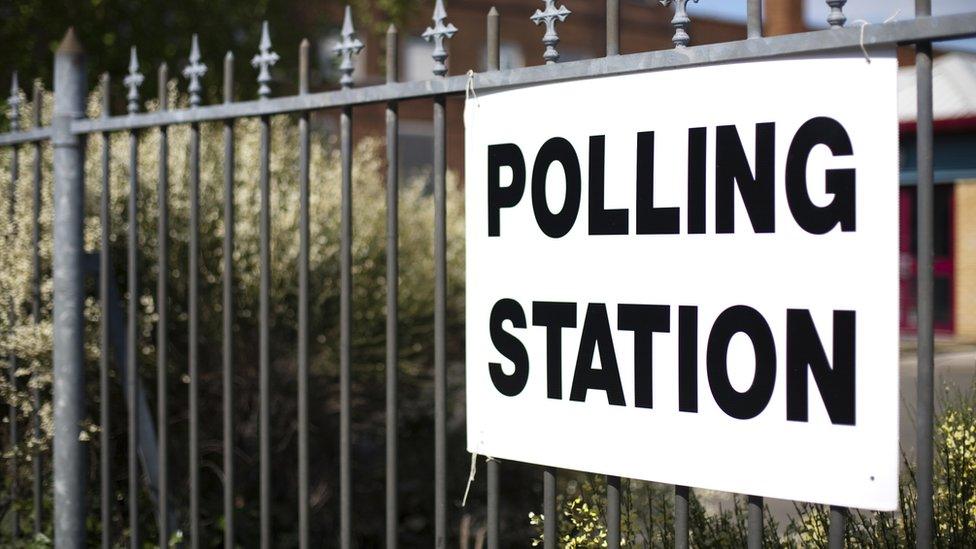Call to reform Scottish election chief payouts
- Published

Some of Scotland's top returning officers are (clockwise from top left) Highland Council's Steve Barron; Glasgow's Annemarie O'Donnell; Fife Council's Steve Grimmond; Lindsay Freeland, of South Lanarkshire, Aberdeen's Angela Scott and Andrew Kerr, of Edinburgh.
There are growing calls to reform the system that gives highly-paid council chiefs extra payouts for acting as election returning officers.
Some local authority heads can get extra payments of tens of thousands of pounds for being in charge of election results in their area.
With two major polls in the next seven weeks, almost £500,000 could be shared between 32 voting chiefs.
The UK Cabinet Office, which sets the rate, said fees were kept under review.
It said the role was "statutorily independent from their normal employment".
However, Willie Sullivan, the director of Electoral Reform Society Scotland, said the public would find the sums involved "quite remarkable".
The society that represents council chiefs, SOLACE Scotland, said the system was "old fashioned" and would probably benefit from review.
The biggest beneficiary of the payments will be Glasgow City Council chief executive Annemarie O'Donnell, who receives an annual salary of £160,000.
Election fees
As returning officer for eight constituencies and the Glasgow region in the Scottish Parliament election, she will be paid more than £33,000.
Her role in the EU referendum will bring to more than £77,000 her fees for running three polls in two years.
A council spokesman said Ms O'Donnell had "always donated a portion of election fees to charity".
Lindsay Freeland, South Lanarkshire Council's chief executive, could receive more than £52,000 for running four polls in three years.
Meanwhile Fife Council said the £62,450 claimed by its head Steven Grimmond would be shared with his depute returning officer.
The level of fees has led to calls for returning officer responsibilities to be included in the formal role of council chief executives.
Willie Sullivan, the director of Electoral Reform Society Scotland, said returning officers had a "vital and sometimes tricky job to do".
He added: "However I'm sure the public will find these sums quite remarkable. The importance of these roles makes one wonder why they are not already part of the job description.
"Then perhaps some of this money could be spent on convincing Scots who don't vote, the majority of whom are poor, that voting is worthwhile."
Routine duties
Navraj Singh Ghaleigh, a lecturer in electoral law at the University of Edinburgh, called for the "wildly generous" payments system to be reviewed and updated.
He added: "With elections and referendums occurring once a year (twice this year), running ballots is now a routine part of the duties of local authorities.
"There are procedures and practices in place for the operation of elections which are for all practical purposes, core to the duties of local authorities. As such large ad hoc payments and allowances (which are of course superannuated) are not the appropriate form of reward.
"Not only are the sums very substantial, it is far from clear that they should go to chief execs, rather than their staff.
"It also raises the larger question of whether local authorities should undertake such duties at all, or whether a professionalised electoral service (under the auspices of perhaps the Electoral Commission) might not be better placed."


What is a returning officer?
Returning Officers are responsible for ensuring that elections are administered effectively in their constituencies.
They are personally liable for the conduct of polls and could face court action if they breach their official duty.
As well as providing polling stations, managing the postal voting process, verifying and counting votes, they must declare the result.
Find more information on the Electoral Commission's website, external.

The City of Edinburgh Council said its former head, Sue Bruce, donated a proportion of her election fees to charity.
It is unclear how her successor, Andrew Kerr, who joined the local authority after last year's general election, will spend his returning officer payment.
In North Lanarkshire, its chief executive, Paul Jukes, intends to use the cash to pay his senior team's election fees.
A spokesman said the approach, which was adopted by Mr Jukes's predecessor, Gavin Whitefield, reduced expenditure in the overall election budget.
However it is not known whether the heads of Highland, Fife and Aberdeen City have claimed the additional payments.
The local authorities did not answer a series of questions from BBC Scotland asking whether their chief executives claimed returning officers fees for:
The 2014 Scottish independence referendum
The 2015 UK general election
In addition, they failed to say whether the officials planned to claim fees for:
The Scottish Parliament elections
The EU referendum.
Aberdeen City Council also declined to reveal its chief executive's salary. A spokeswoman said it did not comment on "individual staffing matters".
A Cabinet Office spokeswoman said: "Returning officers have traditionally been paid an extra fee because their role is statutorily independent from their normal employment and delivering properly conducted elections is a considerable responsibility.
"Those fees have always been capped to ensure value for money for the taxpayer but we keep this under review."
Malcolm Burr, the chair of the Society of Local Authority Chief Executives (SOLACE) Scotland, said: "Elections are now more numerous, complex and regulated than they used to be.
"They are subject to an increased amount of audit and the Returning Officers have a personal responsibility to ensure that elections are carried out properly and in accordance with electoral law.
"It is right that those responsible are appropriately remunerated for their work and responsibility."
Mr Burr, who is the chief executive of Comhairle nan Eilean Siar (Western Isles Council), added: "However it is undeniable that the system of remuneration is an old fashioned one and would probably benefit from review."
